Reopening of Kaesong complex requires UN sanctions-related review: official
By a2017001Published : May 11, 2017 - 15:16
A resumption of the now-shuttered South Korean industrial park in North Korea should be closely reviewed due to its possible conflict with UN sanctions resolutions, a government official said Thursday.
As liberal President Moon Jae-in took office Wednesday, attention is being drawn to whether Seoul could resume the operation of the Kaesong Industrial Complex, which was shut down last year following Pyongyang's nuclear and missile provocations.

The complex, once hailed as the symbol of inter-Korean reconciliation, was closed as Seoul said that the money generated from the factory park is suspected of bankrolling the North's nuclear and missile arsenal.
"There are many talks being held about whether the Kaesong park and the joint tour program at Mount Kumgang are linked to the UN sanctions. There is a need for review on the issue," said an official at South Korea's unification ministry.
The official hinted that the government is likely to reveal its stance on the matter after relevant ministries review and coordinate it with each other.
Moon earlier raised the need to resume the Kaesong complex and the tour project at the mountain on North Korea's east coast, but he later struck a cautious note over hasty resumptions of the two projects.
"If North Korea comes to talks for denuclearization after freezing its nukes, we would be able to resume them," Moon told a forum in late April.
The ministry said last year that even if the factory zone is reopened, South Korea cannot operate the same way as it did previously as the UN sanctions are zeroing in on curbing financial transactions with North Korea.
When the complex was running, South Korean firms sent wages for the North Korean workers in dollars to the North's committee running the complex via a branch of a South Korean bank in Kaesong.
The committee then distributed coupons or North Korean bills equivalent to about 30-40 percent of the total wages to the workers after sending the hard currency to the North Korean regime.
The latest sanctions resolutions call for closing existing representative offices, subsidiaries and bank accounts in North Korea, and prohibiting public and private financial support with North Korea. (Yonhap)






![[KH Explains] Can tech firms' AI alliances take on Nvidia?](http://res.heraldm.com/phpwas/restmb_idxmake.php?idx=644&simg=/content/image/2024/05/07/20240507050619_0.jpg&u=)










![[K-pop’s dilemma] Time, profit pressures work against originality](http://res.heraldm.com/phpwas/restmb_idxmake.php?idx=652&simg=/content/image/2024/05/08/20240508050705_0.jpg&u=20240508171126)
![[Today’s K-pop] NCT Dream to drop pre-release from 2nd Japan single](http://res.heraldm.com/phpwas/restmb_idxmake.php?idx=642&simg=/content/image/2024/05/08/20240508050725_0.jpg&u=)